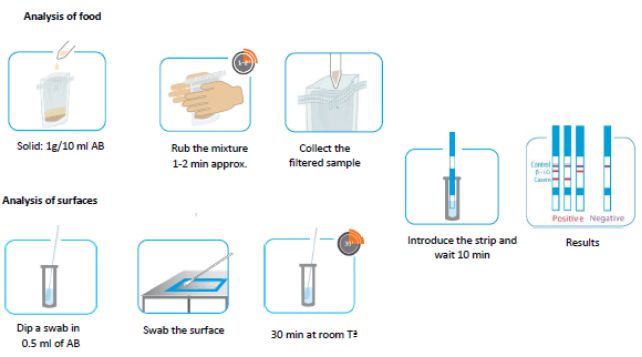



Allergens analysis in food
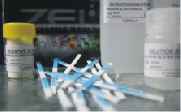 |
PROTEON GLUTEN/MILK/EGG EXPRESS - Rapid test for detection of gluten, milk or egg in foodIt is a lateral flow test for qualitative determination of gluten in food. The kit allows the food industry to assure, of an easy and rapid form, the performance of the food labelling regulations and constitutes an effective tool for the quality self-control. The celiac disease is a disorder that affects the intestine causing interferences in the absorption of nutrients. This disease is caused by an immunological inappropriate response to the gluten, mixture of proteins in cereals as wheat, barley, and rye. The Commission of Codex Alimentarius establishes the denomination of "gluten free" for food that contains lower than 20 ppm of gluten. More recently, the European Commission has approved the regulations for the label of "Gluten free" food. Technical specifications
|
 |
PROTEON DUO MILK EXPRESSIt is a double test to reveal the presence of milk by combining the detection of Beta-lactoglobulin (Beta-LG), as an indicator for whey proteins, and casein for caseinates. This test will help you to assure a correct milk labelling. Beta-lactoglobulin, casein, Alpha-lactoalbumin and seroalbumin are the major protein of milk. This duo test detects the main milk allergen indicators. Therefore, it is especially useful when the source of milk is unknown, such as control of suppliers or in industries where different production processes using whole milk, whey or caseinate are carried out. Single tests targeting only one of these groups of proteins are suitable for detection of milk, but can miss out the present of some byproducts. High temperatures or high pressures as well as cleaning procedures with alkaline detergent can alter the protein structure. Therefore, the double detection of Beta-LG and casein is also recommended in those circumstances as the probability of detecting milk increases. Limit of detection (LOD) for Beta-lactoglobulin: 0.8 ppm (mg/kg) Limit of detection (LOD) for casein: 2 ppm (mg/kg) for example LOD for UHT Milk: 0.05 % (0.05 ml/100 mL) The test can be used to analyse solid sample and also to analyse working surfaces. The test was verified on cow milk. When the concentration of allergen is too high, prozone effect can occurs. If the sample has a very high concentration of the allergen, a false negative can appear. For PROTEON DUO MILK, prozone effect can occurs at > 8000 ppm of b-lactoglobulin.
|
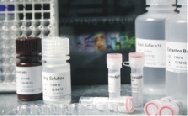 |
PROTEON EGG - ELISA test for egg quantification in foodThis test is recommended to control egg presence in food and cross contamination along food chain production and distribution (from farm to folk). Food allergens can trigger an adverse reaction of the immune system whose importance varying form individual to individual. In egg allergy, symptoms can vary from mild (for instance hives) to severe reactions such as anaphylaxis. Egg is one of the most frequent causes of allergy in five years old children. The prevalence of egg allergy is between 0.5-2% in children aged 2.5 years. In adults 12% of food allergy is caused by egg. For this reasons egg and products thereof require mandatory mention in food labels in the European Union (Annex II of Regulation (EU) 1169/2011) or other countries as USA and Japan. Egg is an ingredient widely used in food industry. As a consequence egg is a hideous source of hidden allergen. Egg white represents 60% of whole egg. Egg white is compound by 11% of proteins and 0.2% of fats. Ovalbumin is the major protein in white egg (54%) and together with ovomucoid, lysozyme and ovotransferrin are the main allergen in egg. Technical specifications
|

|
PROTEON EGG TR - ELISA test for egg quantification in heat treated food matrixIt is is an ELISA test for the quantification of egg proteins in food matrix, especially heat treated food. Technical specifications
|
 |
PROTEON MILK - ELISA test for milk quantification in foodIt is an ELISA test kit that helps to verify milk presence in food and control cross contamination in manufacture and distribution along food chain. Beta-lactoglobulin together with caseins, Alpha-lactoalbumin and seroalbumin are the main allergens in milk Some foods additives and products such as milk, eggs, soy and nuts can cause food allergic reactions. Food allergens can trigger an adverse reaction of the immune system whose importance varying form individual to individual. The cow milk protein (CMP) allergy incidence is between 0.3-7% depending on studies. Cow milk is compound of 85% water, 3.5% proteins, 3.4-4% fat, 4.9% lactose and 0.7% minerals. Cow milk protein composition is based on 80% of caseins and 20% of whey proteins such as Beta-lactoglobulin, Alpha-lactoalbumin and seroalbumin among others. Milk can be a source of hidden allergen because many non dairy products use milk thereof as ingredient. Technical specifications
|
 |
PROTEON SOY - ELISA test for soy quantification in foodPROTEON Soy is an ELISA test for detection and quantification of soya proteins in different food matrix and working surfaces. Food allergens can trigger an adverse reaction of the immune system whose importance varying form individual to individual. Soyabean is one of the 8 big most allergenic foods. Soybeans and many products thereof require mandatory mention in food labels in the European Union (Annex II of Regulation (EU) 1169/2011). Other countries legislations such as USA, Australia & New Zeeland, Canada or Japan also compel soy declaration in label. Soy allergy is of particular importance because soybeans are widely used in food manufacture and represents one of the main sources of hidden allergens. 35% of soybeans are compound by proteins, around 31% by carbohydrates and 20% by fats. Then, soya is one of the main vegetal protein source and many whole soybeans products can be found in the market (soy milk, yoghurt, soy sprout, tofu, miso, etc). Soya is also used as product thereof in flour, protein concentrate, protein isolate or textured soy in products such us baby foods, beads, snacks, meat products and many others. Besides, many oil products; which appear in salad dressing, sauces, chocolates or candies among others, and emerging products (isoflavones, saponins or enzymes) are obtained from soy. Technical specifications
|
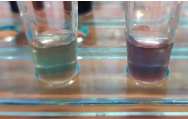 |
Cleaning test with 'CLEAN SURFACE PROTEIN PLUS'Dirty residues indicate poor cleaning and can lead to bacterial growth. Detects protein and reducing agents on surfaces and in hard to reach areas. It detects as little as 50 ug of protein. For the test procedure there is no need of thermal preparation of the sample. The test works at room temperatures. The kit with the reagents and the tubes must be stored at the refrigerator at temperatures 2-8 C. Before proceeding with the test, the tubes and the reagents must stay outside of the refrigerator for at least 5 minutes. The final reading of the results are up to 10 minutes but a stable, safe result can be obtained after 5 minutes. Contents of kit Clean Surface Protein Plus
|
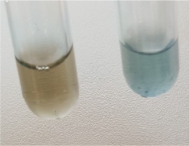 |
Cleaning test with 'CLEAN SURFACE PROTEIN ULTRA'The Clean Surface Protein Ultra is the most sensitive, rapid test that has the ability to detect residual proteins and allergens left behind on the surfaces, instruments, machinery. Ideal for clinics, surgical operation rooms, laboratories, dental cabinets, endoscopes, hygienic stores (e.g. super markets, restaurants), factories. An easy to read color change gives accurate final result in 10 seconds. The Clean Surface Protein Ultra test is based on de-binding solution used in clinical\ chemistry and can detect protein and allergen residues within 0.1 ug sensitivity with no need of incubation or prior preparation.
|
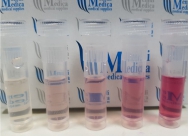 |
Hygiene Surface Test StaviCheck CombiGlucose is a carbohydrate abundant in 85% of foods and lactose is a disaccharide present in all dairy products. StaviCheck Combi is the ideal tool for monitoring surface hygiene in environments where food products are processed. StaviCheck Combi will turn pink if glucose and/or lactose are present in sample. The color intensity is dependable to the concentration of glucose and/or lactose. The test is capable to detect the presence of D-glucose ( L.O.D. 0.97 umoles) and lactose (L.O.D. 2.05 umoles) on a surface. In qualitative mode, the interpretation can be done in 30-60 seconds, in quantitative mode, at ELECTRA Analyzer, the numerical results are obtained within 10 minutes.
|
Oberdorfstrasse 51
CH 3930 Eyholz
tel + 41 27 946 80 18
fax + 41 27 946 86 42
info@sysmatec.ch
